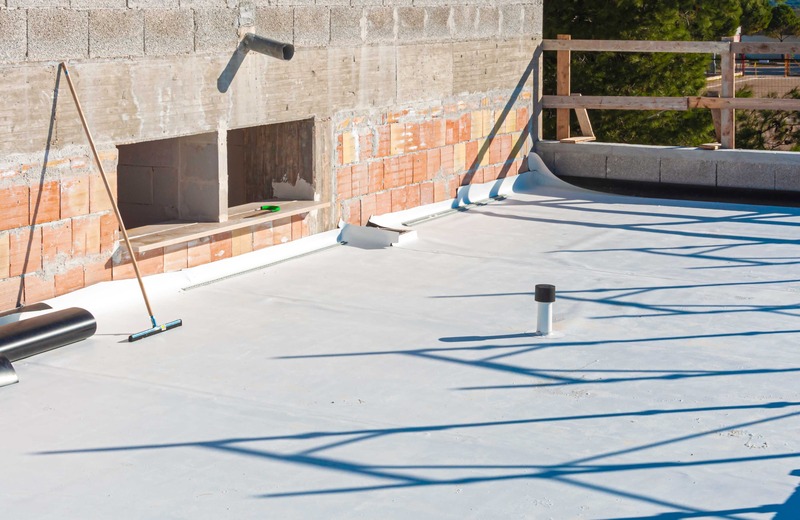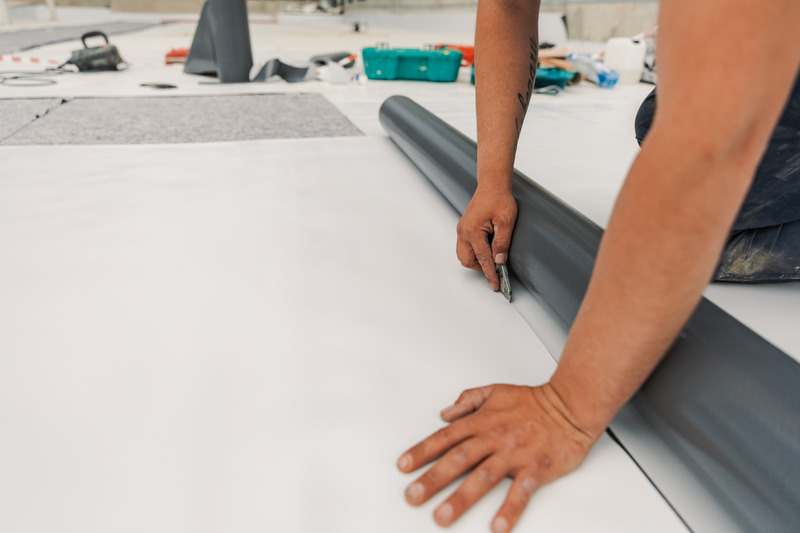Commercial roofing is an essential part of any business property, providing protection, energy efficiency, and long-term value. However, property owners and facility managers often have questions about installation, maintenance, repairs, and costs.
At Bull Run Roofing, we understand that making informed decisions about your commercial roof is important. In this guide, we’ll answer the most common commercial roofing FAQs, covering everything from materials to lifespan, maintenance, and repairs.
What Are the Most Common Types of Commercial Roofing Systems?
Commercial roofing comes in a variety of materials, each designed for different building needs and climates. Here are some of the most commonly used commercial roofing systems:
- TPO (Thermoplastic Polyolefin) – A cost-effective, energy-efficient, and durable roofing membrane that reflects sunlight and helps lower cooling costs.
- EPDM (Ethylene Propylene Diene Monomer) – A synthetic rubber roofing material known for its resistance to weathering and long lifespan.
- Metal Roofing – Highly durable and long-lasting, metal roofs are resistant to fire, wind, and impact.
- Modified Bitumen – A flexible asphalt-based roofing system often used for low-slope commercial buildings.
- Built-Up Roofing (BUR) – A multi-layered system consisting of tar and gravel, providing excellent waterproofing and durability.
Each material has its pros and cons, and the best choice depends on your building’s structure, budget, and climate conditions.
How Long Does a Commercial Roof Last?
The lifespan of a commercial roofing system depends on the material, installation quality, and maintenance routine. Here’s an estimated lifespan for common roofing types:
- TPO: 15–30 years
- EPDM: 20–30 years
- Metal: 40–70 years
- Modified Bitumen: 20–30 years
- Built-Up Roofing (BUR): 20–30 years
Regular maintenance and inspections can help extend the life of your commercial roof and prevent costly repairs.

How Much Does a New Commercial Roof Cost?
The cost of a commercial roof varies based on several factors, including material choice, roof size, installation complexity, and labor costs. On average, commercial roofing costs range from $4 to $12 per square foot, depending on the system used.
Some factors that impact cost include:
- Roof Size and Slope – Larger roofs require more materials and labor, increasing costs.
- Material Selection – Higher-quality materials like metal or TPO generally cost more but last longer.
- Installation Complexity – Buildings with HVAC units, skylights, or unique structural designs require more labor and expertise.
- Roofing Contractor Experience – Hiring an experienced, licensed contractor ensures proper installation but may come at a higher cost.
A professional inspection and estimate from a trusted roofing contractor will give you a clearer picture of your project’s cost.
How Often Should a Commercial Roof Be Inspected?
Routine inspections are crucial for maintaining a commercial roofing system. It’s recommended to schedule a professional roof inspection at least twice a year, typically in the spring and fall.
Additionally, you should have your roof inspected after severe weather events, such as heavy storms, hail, or high winds. Regular inspections help detect small issues before they turn into costly repairs.
The National Roofing Contractors Association (NRCA) recommends proactive roof maintenance to extend the lifespan of commercial roofing systems.
What Are the Signs That a Commercial Roof Needs Repairs?
Early detection of roofing problems can prevent costly damage. Look for these common warning signs that indicate your commercial roof may need repairs:
- Leaks or water stains on ceilings and walls
- Pooling water or poor drainage on flat roofs
- Cracked, blistered, or missing roofing materials
- Mold or mildew growth in roofing layers or inside the building
- Sagging roof areas indicating structural damage
If you notice any of these signs, it’s best to schedule an inspection as soon as possible.
What Is the Best Way to Maintain a Commercial Roof?
Regular maintenance is key to extending the lifespan of a commercial roofing system. Here are some best practices for keeping your roof in top condition:
- Schedule Regular Inspections – Have a professional inspect your roof at least twice a year.
- Clean Gutters and Drains – Clogged drainage systems can lead to water pooling and leaks.
- Address Repairs Quickly – Small issues can escalate if left unattended.
- Trim Overhanging Trees – Branches can cause punctures or damage during storms.
- Monitor for Mold and Algae Growth – Excess moisture can lead to costly damage over time.
The Federal Emergency Management Agency (FEMA) provides guidelines on maintaining commercial buildings to withstand weather-related damage.

How Can I Improve the Energy Efficiency of My Commercial Roof?
Energy-efficient roofing can reduce cooling and heating costs while improving indoor comfort. Consider these strategies to enhance efficiency:
- Install Cool Roofing Materials – TPO and white EPDM membranes reflect sunlight and reduce heat absorption.
- Improve Roof Insulation – Proper insulation helps regulate indoor temperatures.
- Apply Reflective Roof Coatings – Roof coatings can extend lifespan and improve thermal performance.
- Ensure Proper Ventilation – Good ventilation prevents heat buildup and moisture damage.
Investing in energy-efficient roofing solutions can lead to long-term savings on utility bills.
Can a Commercial Roof Be Repaired Instead of Replaced?
In many cases, a commercial roofing system can be repaired rather than replaced, depending on the extent of the damage. If the issues are localized, such as minor leaks or a few damaged areas, targeted repairs can restore the roof’s functionality.
However, if the roof has widespread deterioration, structural issues, or has reached the end of its lifespan, a full replacement may be the best option. A professional roofing contractor can assess your roof’s condition and recommend the most cost-effective solution.
How Do I Choose the Right Commercial Roofing Contractor?
Selecting the right roofing contractor is crucial to ensuring a high-quality installation or repair. Here’s what to look for when hiring a commercial roofing company:
- Experience and Licensing – Ensure the contractor is licensed, insured, and experienced in commercial roofing.
- Reputation and Reviews – Check online reviews and ask for references.
- Warranty and Guarantees – Look for contractors that offer warranties on materials and workmanship.
- Transparent Pricing – A reputable contractor will provide a detailed, written estimate with no hidden fees.
- Local Expertise – A company familiar with Central PA weather conditions will recommend the best roofing solutions.
At Bull Run Roofing, we are committed to providing top-quality commercial roofing services, using the best materials and expert craftsmanship.
Schedule Your Free Commercial Roofing Estimate Today!
Whether you need an inspection, repairs, or a full commercial roof replacement, Bull Run Roofing is here to help. Our expert team serves businesses throughout Central PA, ensuring durable and energy-efficient roofing solutions.
Get a free estimate now and let’s discuss the best roofing options for your commercial property!
